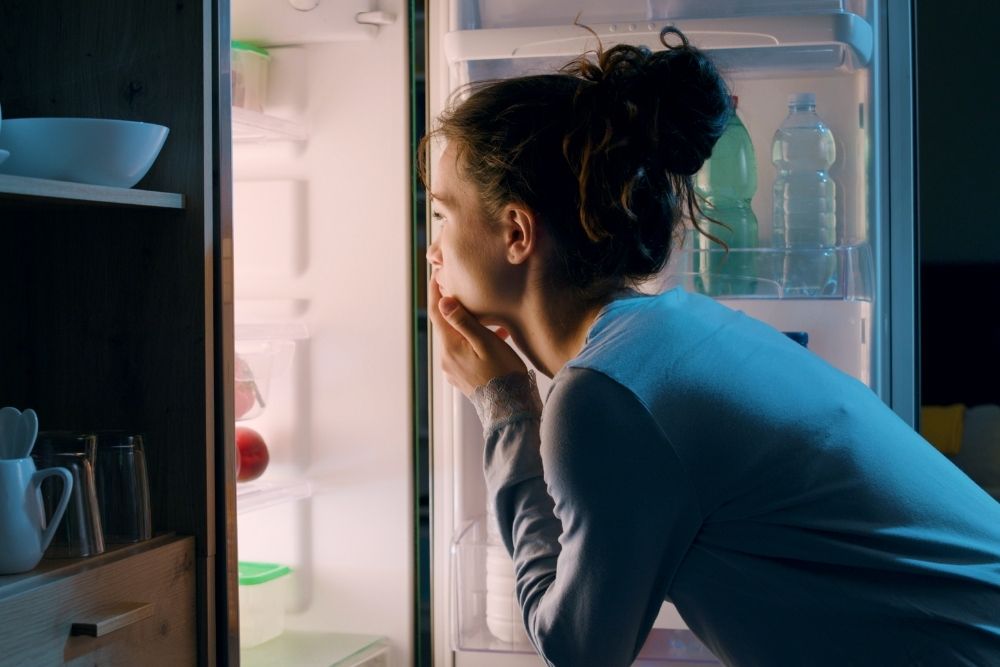This post is the third entry in our series about the importance of eating healthily in recovery. The first post in the series focused on good breakfast choices and the importance of hydration. The second entry considered lunch and afternoon snacks.
This time out, we are turning our attention to dinner and to late-night snacking options that will not negatively affect your ability to get the restful sleep you need. (Sleep, after all, is just as essential to your recovery from a substance use disorder as good nutrition is.)
Before we jump in, here is our standard reminder: We are not nutritionists. Talk to your doctor to get more specific advice regarding your nutritional needs—both generally and in recovery.
Dedicate Yourself to Healthy Dinners
Have you ever found yourself in a conversation like this?
Person One: What do you want for dinner?
Person Two: I don’t know. What do you want?
Person One: Oh, anything is fine.
Person Two: How about tacos?
Person One: Nah. I’m not really feeling tacos.
A conversation like that can go on and on—frustrating everyone while not feeding anyone. And even if you eventually agree on what to have for dinner, the idea of cooking it can seem exhausting. Next thing you know, you are in a similar conversation to the one above about where to go for dinner. That often leads to eating food that is less healthy than what you might have prepared at home.
Of course, it is certainly possible to eat healthily at a restaurant or when you grab takeout (and an indulgence once in a while is okay, too). Still, we want to offer some advice that might make it easier for you to consistently make healthy evening meals in your own kitchen.
- Plan (and even prep) your meals in advance: If you plan out, say, a week’s worth of dinners, you can eliminate the day-to-day decision making that can be so frustrating. Spending a little time once a week can save you a lot of time and stress. Prepping meals in advance can also be a great way to make dinnertime decisions quick and easy.
- Learn to cook some simple and quick dishes: Often, one of the challenges people face when they are trying to eat more intentionally is that they do not know how to cook very many things. It might seem daunting to learn new recipes, but it does not have to be. In fact, here is a list of quick and healthy dinner recipes (and here is a similar list for vegetarians).
- Plan and cook with healthy ingredients in mind: Your dinner choices should include the healthy foods that are at the heart of a diet that supports your recovery: leafy greens, colorful fruits and vegetables, lean proteins, and whole grains.
- Make dinnertime a time to share with family and friends: These days, the idea of gathering around a table each evening to share a meal can seem positively quaint. Who has time for such things? But gathering with family and friends to share a meal is a great way to build and maintain healthy relationships—and those relationships support your quality of life and your recovery.
Good Choices for Late-Night Munchies
While a late-night snack does not sound terribly healthy, the fact is, you can make good choices before bed. Of course, one of the keys is making a nutritious choice. But timing is important, too.
The best time to have a late-night snack is about an hour before your bedtime. You can use your snack time as a reminder that you should power down your screens for the night. That combination, about 60 minutes before you head to bed is a great way to support your sleep.
Good choices for this final snack of the day include peanut butter on whole grain toast, pistachios, and kiwi slices. These and similar foods provide nutrients associated with quality sleep, including magnesium, iron, zinc, omega-3 fatty acids, proteins, and more. Here is a list of good late-night snacking options.
Remember: Every Good Choice Is Progress
It is possible that you have found this series of posts a little overwhelming—especially if the foods we have recommended are far different from what you usually eat. It might seem impossible to make so many changes to your diet.
We get it. And that is why we want to remind you that every small and positive change you make is progress toward supporting your recovery. If you can make one small change into a lasting habit, you will be well-positioned to make a second change—and so on. Slowly but surely, you can make a set of changes that firm up the foundations of your recovery.
We Are Ready to Help
At The Farley Center, located in Williamsburg, Virginia, we offer personalized, evidence-based treatment programs for those who are struggling with drugs or alcohol. A substance use disorder can upend every aspect of your life. Reclaiming your life starts with putting substances behind you. We are ready and able to help you make that all-important change through medically supervised detoxification, a robust rehabilitation program, and a continuum of care that provides ongoing support when residential treatment comes to an end.


